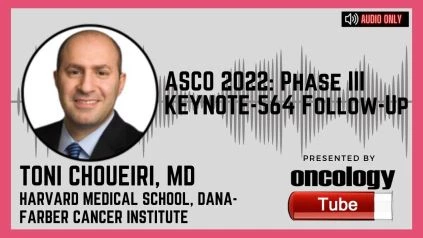Toni Choueiri, MD, Director, Lank Center for Genitourinary Oncology, Director, Kidney Cancer Center, Senior Physician, Jerome and Nancy Kohlberg Chair and Professor of Medicine, Harvard Medical School, Dana-Farber Cancer Institute. In this video, he speaks about the ASCO 2022 Abstract Pembrolizumab as post nephrectomy adjuvant therapy for patients with renal cell carcinoma: Results from 30-month follow-up of KEYNOTE-564.
Origins:
The first positive phase 3 study of adjuvant immunotherapy for patients (pts) with renal cell carcinoma (RCC) at intermediate-high or high risk of recurrence after nephrectomy or nephrectomy and resection of metastatic lesions is the double-blind, multicenter, randomized KEYNOTE-564 study (NCT03142334). With 24 months of follow-up, adjuvant pembrolizumab resulted in a statistically significant improvement in disease-free survival (DFS) vs placebo (HR 0.68, 95 percent CI 0.530.87; P = 0.0010 [one-sided]). We present updated efficacy and safety data from KEYNOTE-564 after an extra 6 months of follow-up.
Methodology:
Patients had histologically confirmed clear cell RCC (pT2, grade 4 or sarcomatoid, N0 M0; pT3 or pT4, any grade, N0 M0; any pT, any grade, N+ M0; or M1 NED [no evidence of disease after primary tumor and soft tissue metastases completely resected 1 year from nephrectomy]) and had undergone surgery 12 weeks before randomization. DFS by investigator assessment was the primary outcome in all randomized patients (ITT population). A significant secondary objective was overall survival (OS). A secondary aim was safety/tolerability in all treated patients.
Outcomes:
994 patients were randomly assigned to either pembrolizumab (N = 496) or placebo (N = 498). The median (range) follow-up, defined as the duration from randomization to data cutoff, was 30.1 (20.847.5) months as of the data cutoff date of June 14, 2021. The DFS benefit of pembrolizumab was maintained in this updated analysis (HR 0.63, 95 percent CI 0.50.80; nominal P 0.0001) and was consistent across subgroups, including patients with M0 disease with intermediate-high risk of recurrence (HR 0.68, 95 percent CI 0.520.89), M0 high risk of recurrence (HR 0.60, 95 percent CI 0.331.110), or M1 NED (HR 0.28, 95 percent CI At 24 months, the estimated DFS rate with pembrolizumab was 78.3 percent against 67.3 percent with placebo. A total of 66 OS occurrences were reported, 23 in the pembrolizumab arm and 43 in the placebo arm (HR 0.52, 95 percent CI 0.310.86, P = 0.0048); the p-value did not exceed the statistical hypothesis testing threshold, and more follow-up for this important secondary endpoint is planned. At 24 months, the estimated OS rate with pembrolizumab was 96.2 percent versus 93.8 percent with placebo. There was no increase in any-grade or grade 3-4 adverse events or steroid use for immune-mediated adverse events with additional follow-up. There were no deaths associated with pembrolizumab.
Observations:
Adjuvant pembrolizumab continued to show a consistent and clinically relevant improvement in DFS versus placebo in patients with RCC at high risk of recurrence after 30 months of follow-up. In the adjuvant situation, no additional safety signals were found with pembrolizumab. NCT03142334 is the clinical trial number.

